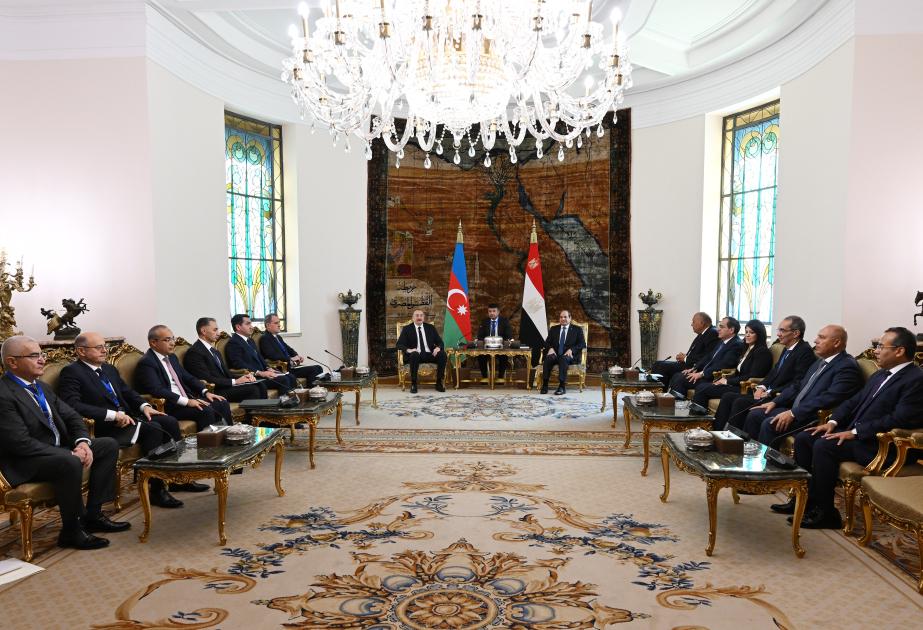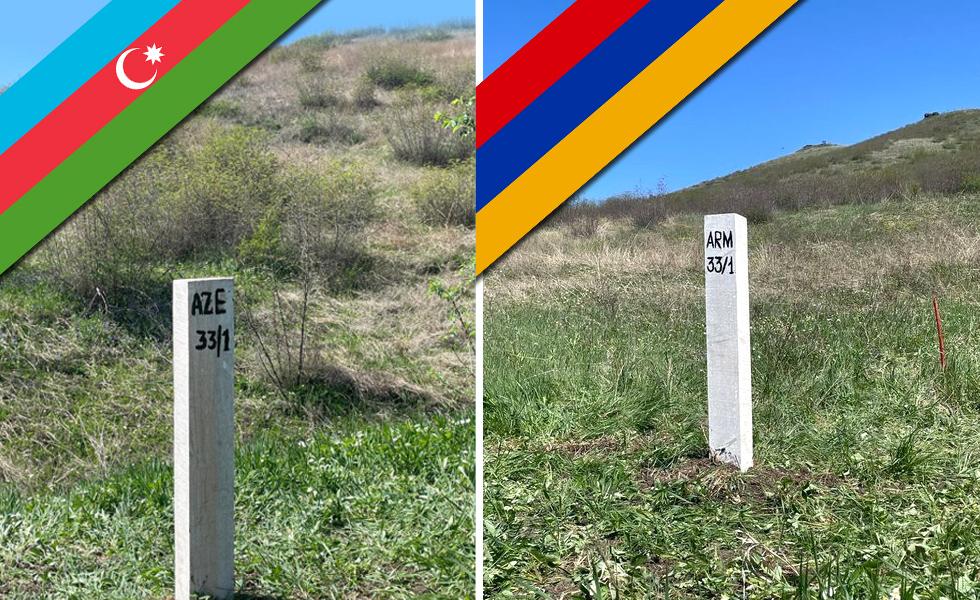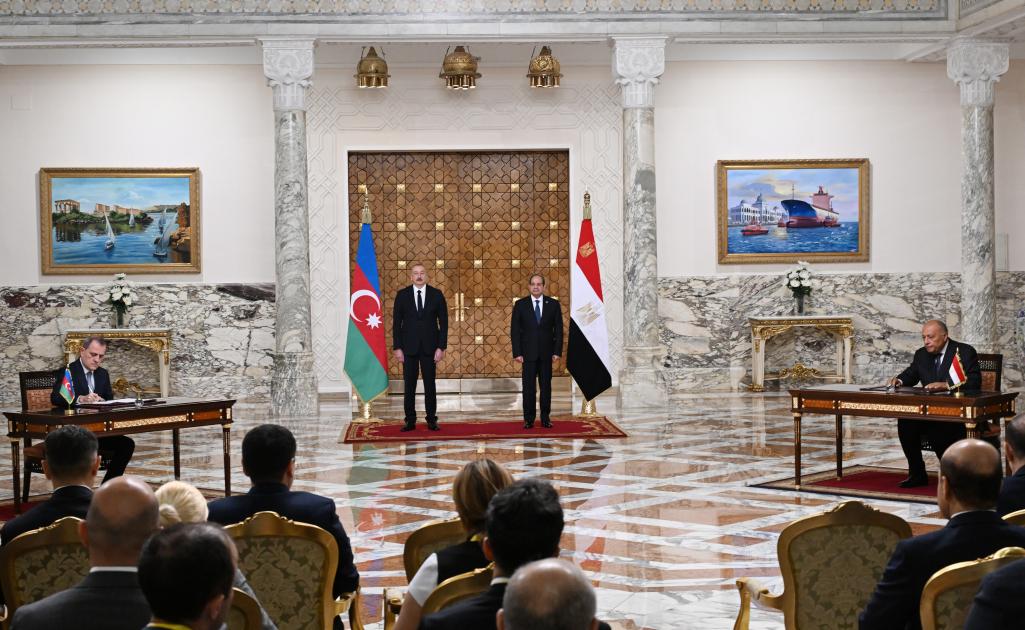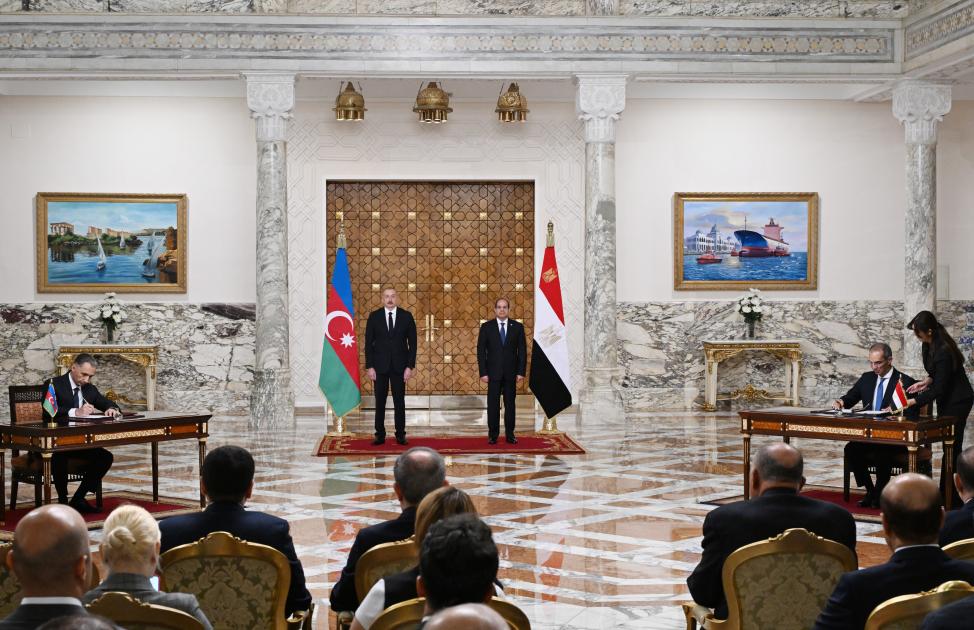A catalyst for bolstering Azerbaijani-Egyptian relations President’s official visit to Cairo
President Ilham Aliyev’s June 7-8 official visit to Egypt, following President Abdel Fattah el-Sisi’s 2023 visit to Azerbaijan, marks a significant milestone in developing Azerbaijani-Egyptian relations. This reciprocal exchange of high-level visits underscores the regular and robust political dialogue between the two nations and highlights their mutual commitment to deepening bilateral cooperation across various domains.
Bolstering political dialogue & international cooperation
When in Cairo, President Ilham Aliyev invited President el-Sisi to the COP29 conference in Baku, an invitation that was “gladly accepted”. This reflects the ongoing and productive political dialogue between Azerbaijan and Egypt. The leaders also discussed various international issues, finding no differences in their perspectives.

Their aligned views on global matters reinforce their collaborative efforts within international organizations such as the United Nations, the Non-Aligned Movement (NAM), and the Organization of Islamic Cooperation (OIC). With Egypt's support, Azerbaijan has chaired the NAM for four years, enhancing the movement's influence and opportunities.
One of the key international issues discussed was the Palestinian-Israeli conflict. President Aliyev reiterated Azerbaijan’s firm stance on the necessity of establishing an independent Palestinian state with East Jerusalem as its capital. He emphasized the urgency of halting the ongoing conflict in Gaza and resolving disputes through negotiations. Azerbaijan supports Egypt's initiatives and efforts in these directions, underscoring the countries’ collaborative approach to promoting peace and stability in the region.
Progress in South Caucasus relations
President Aliyev also briefed President el-Sisi on the developments in the South Caucasus, highlighting the progress in negotiations between Azerbaijan and Armenia. Significant strides have been made in defining the state borders, with approximately 12.7km agreed upon, and the return of four villages in Gazakh District to Azerbaijan after more than 30 years of occupation. These positive developments signal the potential for further progress in the peace process, with Azerbaijan expressing readiness to continue negotiations.
Azerbaijan’s full restoration of state sovereignty and territorial integrity in September of 2023 is a crucial factor in normalizing relations with Armenia. For nearly two years, there have been no ceasefire violations on the Azerbaijan-Armenia border, indicating a stable and peaceful period conducive to further diplomatic efforts.

Enhancing bilateral economic cooperation
Economic cooperation remains a cornerstone of Azerbaijani-Egyptian relations. Both nations have witnessed a significant increase in trade volume, although there is potential for much greater expansion. The agreements signed during President Aliyev’s visit are expected to bolster trade, particularly in sectors such as energy, renewable energy production, the oil industry, pharmaceuticals, and aluminium manufacturing.
The signing of multiple memoranda of understanding (MoUs) and other cooperation agreements between Azerbaijan and Egypt on June 8, witnessed by Presidents Ilham Aliyev and Abdel Fattah El-Sisi, marks a significant advancement in the bilateral relationship between the two nations. These agreements span diverse sectors, underscoring a comprehensive approach to strengthening ties.
MoU on cooperation in the fields of youth and sports
This agreement aims to foster mutual understanding and cultural exchange among the youth of both countries. By promoting sports and youth activities, Azerbaijan and Egypt can build a foundation of goodwill and friendship among future generations. Enhanced youth exchanges and sports collaborations can lead to stronger cultural ties and mutual understanding, contributing to long-term stability and cooperation.
MoU on friendship and cooperation between Baku City and Cairo governorate
Establishing direct cooperation between the capitals of both countries facilitates urban development and cultural exchange. This city-level agreement can act as a microcosm for broader bilateral relations. Joint projects in urban planning, tourism, and cultural heritage can improve living standards and enhance the cultural fabric of both cities.

MoU on cooperation in the fields of electrical and renewable energy
Energy cooperation is crucial given Azerbaijan's rich energy resources and Egypt's growing demand for energy and focus on renewable sources. This agreement paves the way for knowledge sharing, joint ventures, and technological transfer in the energy sector. Joint efforts in renewable energy can help both countries achieve their energy sustainability goals, reducing reliance on non-renewable sources and fostering economic growth through green technology.
Joint Action Plan for 2024-2025 between AZPROMO & GAFI
This action plan focuses on boosting trade and investment between Azerbaijan and Egypt. By setting a structured agenda, both countries can work towards specific economic goals, enhancing bilateral trade and investment flows.
Increased trade and investment will stimulate economic growth, create jobs, and diversify economic activities in both nations.
Protocol of intent on cooperation in petroleum and mineral resources
Cooperation in the petroleum and mineral sectors is strategic given the natural resource wealth of both countries. This protocol signifies a commitment to explore joint opportunities in extraction, processing, and energy production.
Collaborative projects can lead to enhanced efficiency and profitability in the resource sectors, bolstering both economies' energy security.
MoU on exchange of experience in international cooperation
This agreement emphasizes the importance of sharing best practices and experiences in economic development and international cooperation. It reflects a mutual interest in learning from each other’s successes and challenges. The exchange of expertise can lead to better policy-making and implementation, fostering sustainable economic development in both countries.
MoU on cooperation in the ICT sector
As the digital economy becomes increasingly vital, this agreement aims to enhance cooperation in ICT. This includes areas such as digital infrastructure, cybersecurity, and innovation. Strengthened ICT collaboration can drive technological advancements, improve digital governance, and boost the competitiveness of both nations in the global digital economy.
The signing of these documents signifies a comprehensive and strategic partnership between Azerbaijan and Egypt. By addressing various sectors such as youth and sports, urban development, energy, economic cooperation, petroleum and mineral resources, international cooperation, and ICT, both nations are laying a robust foundation for future collaboration. These agreements not only aim to enhance bilateral relations but also contribute to regional stability and development. The multi-faceted nature of these agreements underscores a deep and enduring partnership that is set to yield significant benefits for both countries.
Discussions also focused on new transport corridors. Azerbaijan’s strategic position as a transit hub for the East-West and North-South transport corridors opens up substantial opportunities for collaboration in transport and logistics. The fully developed infrastructure in Azerbaijan is poised to facilitate enhanced connectivity and economic integration between the two countries.
Prospects and joint initiatives
The joint intergovernmental commission, an essential platform for bilateral cooperation, is set to meet again this year. The previous meeting, held in Azerbaijan two years ago, laid the groundwork for increased cooperation. The upcoming meeting is expected to further advance the directives given by the presidents, paving the way for significant achievements in various sectors.
President Aliyev expressed his gratitude for the hospitality extended by President el-Sisi, looking forward to welcoming them in Baku for COP29 in November. This ongoing high-level engagement is indicative of the strong and dynamic relationship between Azerbaijan and Egypt, promising a future of continued collaboration and mutual benefit.
Importance of relations with Egypt for Azerbaijan

Egypt's strategic position at the crossroads of Africa, Asia, and Europe, and its control over the Suez Canal, makes it a critical partner for Azerbaijan. Strengthening ties with Egypt can enhance Azerbaijan's access to key international trade routes and markets.
Egypt is a prominent player in the Arab world and Africa. Strong relations with Egypt can bolster Azerbaijan's influence and diplomatic reach in these regions, aiding its foreign policy objectives. Egypt's large market and growing economy present significant opportunities for Azerbaijani businesses. Strengthening economic ties can boost trade volumes, attract investments, and create new business opportunities for both countries.
Egypt's efforts to expand its renewable energy sector align with Azerbaijan's capabilities and expertise in the energy industry. Cooperation in this field can lead to joint ventures, technology transfers, and enhanced energy security for both nations.
Egypt's rich cultural heritage and history offer a valuable avenue for cultural exchange and tourism. Strengthening cultural ties can promote mutual understanding and goodwill between the peoples of both countries. Both Azerbaijan and Egypt are members of the Organization of Islamic Cooperation (OIC). Strong bilateral relations contribute to solidarity and cooperation within the Islamic world, addressing common challenges and promoting shared values.
Conclusion
President Ilham Aliyev’s official visit to Egypt is a testament to the deepening ties between Azerbaijan and Egypt.
Relations with Egypt are strategically important for Azerbaijan across multiple dimensions. From geopolitical and economic benefits to cultural and international collaboration, a strong partnership with Egypt enhances Azerbaijan's global standing, promotes regional stability, and creates opportunities for mutual growth and development.








